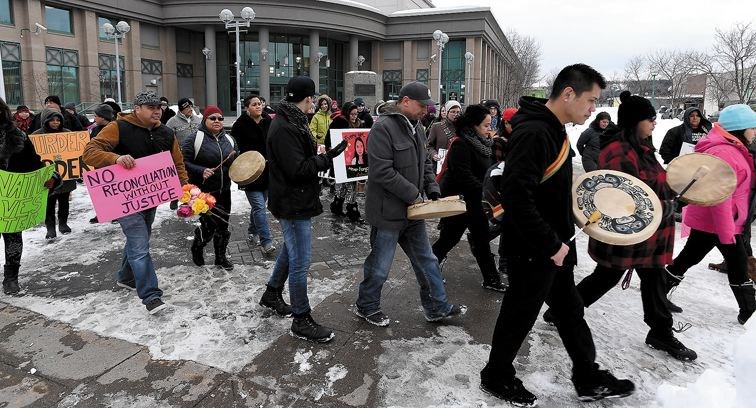Close to 50 people gathered on the steps of the Prince George Courthouse in response to last week's verdict that found Raymond Cormier not guilty of murdering indigenous teen Tina Fontaine.
Fontaine's body was found in Manitoba's Red River in 2014, wrapped in a duvet and weighed down with rocks.
In the days leading up to her disappearance, she was bounced between police custody, several hotels run by Manitoba's Child and Family Services and hospital care. The verdict, which came just weeks after a jury in Saskatchewan found Gerald Stanley not guilty in the death of 20-year old Colten Boushie, has renewed calls for reform of the Canadian justice system and of provincial systems for youth in care. Activists and indigenous leaders have pointed to these two cases as evidence that the justice system is stacked against indigenous people in Canada.
Speaking at the rally in Prince George, Terry Teegee, B.C. regional chief of the Assembly of First Nations, said the Fontaine verdict was a reminder that indigenous girls and women are often failed by many social support systems.
"It's not only the justice system, it was the healthcare system. It was the child family services system in Winnipeg and Manitoba that failed Tina Fontaine. She was just 15. She was just a child," Teegee said.
"I have a 14-year-old daughter. And you've got to think about what kind of society you want to live in, that indigenous women and indigenous girls are so vulnerable."
The Crown argued during the trial that Cormier admitted to killing Fontaine, and presented police recordings that appeared to contain a confession by Cormier.
The defence argued that there was not sufficient forensic DNA evidence to satisfy the grounds for a conviction.
Cormier did not take the stand during the trial.
Organizers of the rally in Prince George sought to link the experiences of Fontaine in the foster care system with the experience of Indigenous youth in care in B.C. There have been many reports of deaths of youth in care over the last number of years, and indigenous youth are overrepresented amongst youth in care.
"Indigenous youth in care require services and supports developed and delivered by indigenous peoples," said Nancy Sandy, of the B.C. Aboriginal Justice Council in a media statement.
"Services need to be culturally relevant and funded to the same extent as services for non-indigenous children in care. How many more of our young people will die or end up incarcerated before Canada stands up and does something?"
The rally ended in a march to the offices of the Ministry of Children & Family Development in downtown Prince George.
"It is only through pressure from people like all of us here today that we'll be able to give a voice to young girls like Tina and help put a spotlight on the need for changes required in the justice system, the police system and the child welfare system," said Reg Mueller, deputy tribal chief of the Carrier Sekani Tribal Council.
Roughly 50 people gathered for a rally #TinaFontaine rally in the #cityofPG . Terry Teegee, regional chief of the BC Assembly of First Nations, made the link between youth in care in B.C. and the government systems Fontaine passed through in Manitoba. pic.twitter.com/4lESSjkc5Y
— Stuart Neatby (@stu_neatby) February 27, 2018



